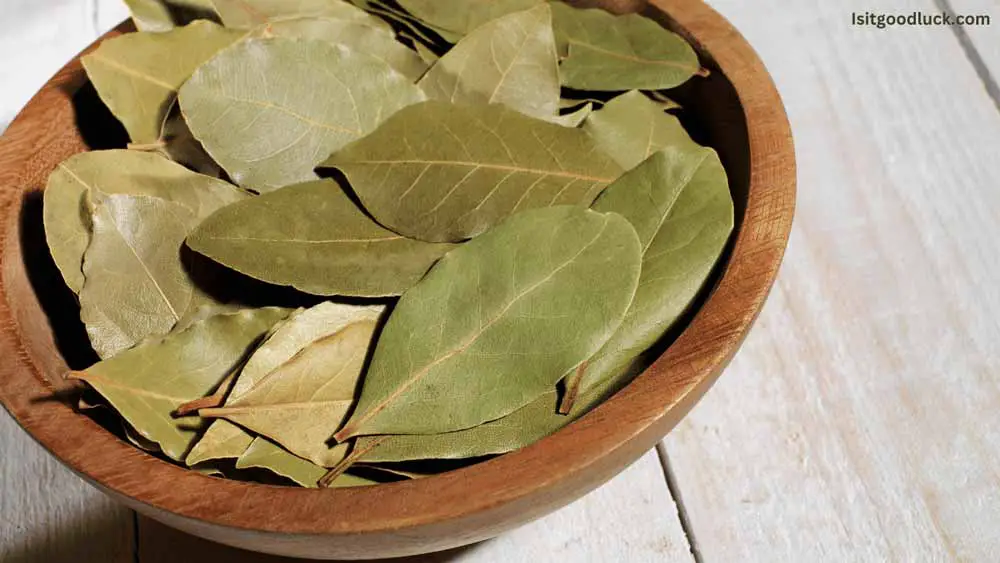The bay leaf, renowned for its culinary applications, potent aroma, and medicinal properties, carries significant symbolism and folklore in its rich history.
It’s linked with prosperity, good luck, and even protection against evil spirits across multiple cultures. But is it good luck to get the bay leaf?
In this article, we will dive deeper and try to figure out if it is really good luck to get the bay leaf and why it is called the fortune bearing herb. So, let’s begin.
Contents
- 1 Bay Leaves and Good Luck: The Greek Origins:
- 2 A Symbol of Protection and Prosperity: Bay Leaves in Roman Times:
- 3 The Bay Leaf Tradition in Contemporary Times:
- 4 Unveiling the Power of Bay Leaves:
- 5 Harnessing the Power of Bay Leaves: Practical Methods:
- 6 Conclusion: Is it Good Luck to Get the Bay Leaf?
- 7 FAQs:
Bay Leaves and Good Luck: The Greek Origins:
The association of the bay leaf with good luck is believed to have roots in ancient Greece. The bay laurel tree, from which bay leaves are harvested, was considered sacred to Apollo, the Greek god of victory, prophecy, and poetry.
Athletes and poets wore crowns made from bay leaves to symbolize their success. Over time, this symbolic gesture evolved into believing that bay leaves were carriers of good luck.
A Symbol of Protection and Prosperity: Bay Leaves in Roman Times:
Roman culture adopted the Greek belief in the power of the bay leaf, utilizing its properties to ward off evil spirits and prevent sickness.
Bay leaves were also considered omens of good luck in business and romantic endeavors.

The Bay Leaf Tradition in Contemporary Times:
The tradition linking bay leaves with good fortune thrives in modern cultures. In Italy, it’s believed that finding a bay leaf in one’s food foretells a year filled with luck and good fortune. Greeks still place bay leaves under their pillows to invite pleasant dreams.
Scientifically, no empirical evidence supports the claim that bay leaves bring good luck.
However, these beliefs, deeply rooted in folklore and ancient tradition, continue to offer a glimmer of hope and optimism to those who come across a bay leaf in their food.
Also read: Is it Good Luck for Lightning to Strike a Tree?
Unveiling the Power of Bay Leaves:
Beyond luck, bay leaves are thought to offer protection, promote healing, enhance psychic abilities, and attract wealth.
These potent powers are attributed to the essential oils in the leaves, such as linalool, cineole, and camphor.
The Therapeutic Properties of Bay Leaves:
Research indicates these essential oils can provide an array of health benefits:
- Stress and anxiety reduction: Essential oils in bay leaves have a soothing effect, which can help alleviate stress and anxiety.
- Improved sleep: The calming properties can also enhance sleep quality.
- Boosted immune system: Certain compounds within bay leaves have been found to strengthen the immune system.
- Anti-inflammatory effects: The oils present in bay leaves have shown anti-inflammatory properties.
Moreover, bay leaves are potent antioxidants, protecting our bodies from harmful free radicals that can lead to severe health issues like cancer and heart disease.
Harnessing the Power of Bay Leaves: Practical Methods:
If you’re inspired to welcome good luck into your life using bay leaves, here are some traditional methods:
- Cook with bay leaves: Infuse your meals to invite good luck symbolically.
- Burn bay leaves: The smoke from burning bay leaves purifies the atmosphere and drives away negative energy.
- Place bay leaves in your home: Placing a bay leaf under your pillow could encourage good dreams, or putting one in your wallet could attract wealth.
- Bay leaf tea: Drinking bay leaf tea is believed to enhance the immune system, reduce stress, and promote relaxation.
Conclusion: Is it Good Luck to Get the Bay Leaf?
The tradition of associating bay leaves with good luck is a timeless belief that brings hope and optimism into people’s lives.
While no concrete scientific evidence supports the concept of luck, the bay leaf’s unique chemical composition provides ample health benefits that can positively influence one’s well-being.
Incorporating bay leaves into your daily routine, whether in your meals, home, or tea, is an age-old practice that continues to impact lives positively. And who knows, you might find good fortune coming your way.
Also read other articles regarding finding objects good luck
FAQs:
Is there any scientific evidence to prove that bay leaves bring good luck?
No, no scientific evidence supports the belief that bay leaves bring good luck. This notion is rooted in ancient tradition and folklore, spanning several cultures and centuries. While the bay leaf possesses proven health benefits due to its essential oils, attributing luck or fortune is a matter of belief and personal interpretation.
Can bay leaves be used in any dish to bring good luck?
The notion of bay leaves bringing good luck does not depend on the type of dish they’re used in. However, due to their distinct flavor, bay leaves are commonly used in soups, stews, roasts, and sauces. According to folklore, finding a bay leaf in any dish is considered a sign of good luck.
How do you burn bay leaves for good luck?
To burn bay leaves, you should light the leaf in a fire-safe container. The container should be positioned safely, away from flammable materials. Let the leaf burn completely, filling your space with its aromatic smoke, which is said to cleanse the atmosphere and ward off negative energy.
Can I use any variety of bay leaves for good luck?
The tradition of bay leaves bringing good luck originates from the use of leaves from the bay laurel tree (Laurus nobilis). However, cultural beliefs and practices can vary. If you’re using bay leaves as part of a traditional or cultural practice, it’s best to research or ask someone knowledgeable in that tradition to ensure you’re using the appropriate type of leaf.
Is it safe to drink bay leaf tea regularly?
Yes, it is safe to consume bay leaf tea regularly. Bay leaf tea is known for its potential health benefits, such as improving digestion, reducing stress, and enhancing sleep quality. However, like any herbal supplement, moderation is vital, and individuals with medical conditions or those on medication should consult a healthcare professional before making it a regular part of their diet.





